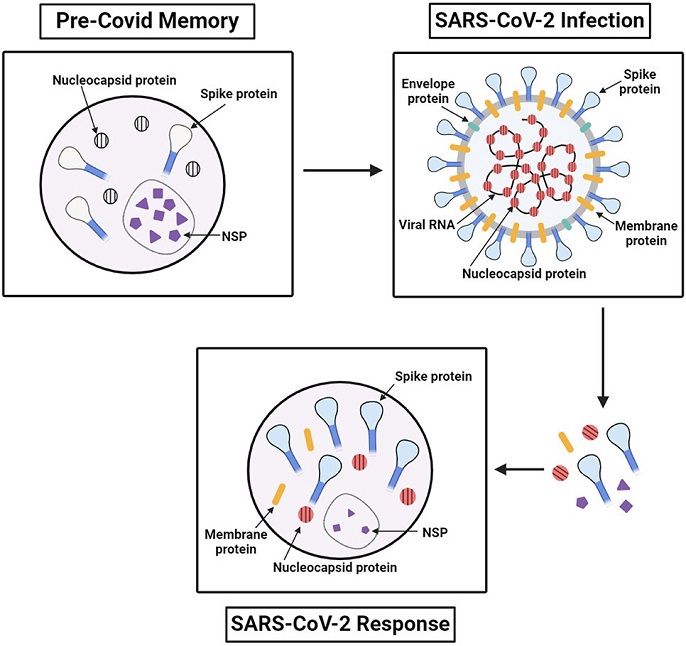Why Your Immune System Doesn't Remember COVID-19 Well! New Findings On CD4 T Cells.
Nikhil Prasad Fact checked by:Thailand Medical News Team May 20, 2024 1 year, 9 months, 1 day, 9 hours, 9 minutes ago
COVID-19 News: As the world grappled with the onset of the COVID-19 pandemic, scientists raced to understand how our immune system responds to the novel coronavirus, SARS-CoV-2. One crucial aspect of this response involves CD4 T cells, a type of white blood cell that plays a vital role in our immune defense. A recent study conducted by researchers from the University of Rochester Medical Center-New York-USA, Weill Cornell Medicine-New York-USA, and St. Jude Children's Research Hospital-Memphis-USA that is covered in this
COVID-19 News report, sheds light on how these cells react to the virus and why previous exposure to similar viruses might not provide the protection we hoped for.
 Graphical Abstract - Immune System Doesn't Remember COVID-19 Well! New Findings On CD4 T Cells.
Pre-Existing Immunity: Not as Effective as Expected
Graphical Abstract - Immune System Doesn't Remember COVID-19 Well! New Findings On CD4 T Cells.
Pre-Existing Immunity: Not as Effective as Expected
Our immune system has a remarkable ability to remember past infections, which helps it respond more effectively to future threats. This memory is the cornerstone of vaccination and immunity. However, this study found that pre-existing CD4 T cells, which had previously encountered seasonal coronaviruses (sCoVs), did not provide significant protection against SARS-CoV-2.
Before the COVID-19 pandemic, many of us had been exposed to seasonal coronaviruses that cause the common cold. These encounters create a pool of memory CD4 T cells that recognize parts of these viruses. Interestingly, these pre-existing T cells did show some reactivity to peptides (protein fragments) conserved between sCoVs and SARS-CoV-2. However, after the first infection with SARS-CoV-2, the immune system did not show a preference for these conserved peptides. Instead, it focused on new, SARS-CoV-2-specific epitopes.
Host-Specific Responses: Variability Across Individuals
One of the key findings of this research is the variability in CD4 T cell responses among different individuals. The study analyzed blood samples from people who had recovered from COVID-19 before vaccines were available. These samples showed that the magnitude and specificity of the CD4 T cell response to SARS-CoV-2 varied greatly from person to person.
For some, the immune response was robust and widespread across various viral proteins. For others, the response was more modest. This variability suggests that individual factors, such as genetic differences in human leukocyte antigen (HLA) molecules, which present viral peptides to T cells, play a significant role in shaping the immune response.
The Primary CD4 T Cell Response to SARS-CoV-2
The study revealed that after the first encounter with SARS-CoV-2, the immune system primarily relies on naive CD4 T cells, which have never been exposed to the virus before. These naive cells were activated and expanded in response to the new viral infection, rather than recalling memory cells from previous encounters with similar viruses.
This finding challenges the assumption that memory T cells from past infections would dominate the response to
a new but related virus. Instead, it appears that SARS-CoV-2 infection drives a primary immune response, with new T cells being recruited to fight the virus.
Structural Proteins: The Focus of the Immune Response
The researchers also discovered that the immune response to SARS-CoV-2 was predominantly directed against the virus's structural proteins, such as the spike (S) protein, membrane (M) protein, and nucleocapsid (N) protein. Among these, the spike protein elicited the strongest CD4 T cell response.
Interestingly, while the spike protein is often the target of vaccines due to its critical role in allowing the virus to enter human cells, this study found that the immune system naturally targets it during infection as well. This reinforces the importance of the spike protein as a focal point for vaccine development.
Differences Between Pre-Pandemic and Post-Infection Responses
To further understand the immune response, the study compared CD4 T cell reactivity in samples taken before the pandemic to those taken after infection. Pre-pandemic samples showed that memory T cells were mostly reactive to conserved regions of seasonal coronaviruses, particularly non-structural proteins.
In contrast, post-infection samples demonstrated a shift in focus towards structural proteins unique to SARS-CoV-2. This shift underscores the immune system's ability to adapt to new threats by generating responses to novel viral epitopes, rather than relying solely on pre-existing memory.
Implications for Future Infections and Vaccinations
These findings have important implications for our understanding of immunity to COVID-19 and other emerging viruses. The apparent lack of significant recall of pre-existing memory CD4 T cells suggests that new infections, even by related viruses, might not benefit as much from prior immunity as once thought.
However, the robust primary response to SARS-CoV-2 also highlights the potential for vaccines to effectively prime the immune system. By targeting key viral proteins, vaccines can induce a strong and specific immune response, even in individuals with diverse HLA types.
Conclusion: A Complex Immune Landscape
The study finding provides valuable insights into the complexity of our immune response to SARS-CoV-2. It reveals that the first encounter with this novel virus primarily involves naive CD4 T cells, leading to a highly individualized and host-specific immune response.
This research underscores the importance of continuing to study the immune system's response to COVID-19 and other infectious diseases. Understanding the nuances of CD4 T cell reactivity can help inform vaccine design and improve our preparedness for future pandemics. By unraveling the intricate dance between viruses and our immune system, scientists can better equip us to face the challenges of emerging infectious diseases.
The study findings were published in the peer reviewed journal: iScience.
https://www.sciencedirect.com/science/article/pii/S2589004224012173
For the latest
COVID-19 News, keep on logging to Thailand Medical News.
Read Also:
https://www.thailandmedical.news/news/doctors-warn-covid-19-mrna-jabs-can-cause-primary-cutaneous-cd4-small-medium-t-cell-lymphoproliferative-disorders-and-cutaneous-lymphomas
https://www.thailandmedical.news/news/breaking-covid-19-news-french-study-finds-that-sars-cov-2-induced-cd4-cell-death-is-possibly-responsible-for-long-covid
https://www.thailandmedical.news/news/breaking-covid-19-news-indian-study-finds-dysregulated-metal-ion-homeostasis-in-cd8-and-cd4-t-cells-of-covid-19-positive-individuals
https://www.thailandmedical.news/news/breaking-covid-19-news-brazilian-researchers-discover-that-sars-cov-2-uses-cd4-to-infect-t-helper-lymphocytes
https://www.thailandmedical.news/news/breaking-news-cardiff-university-researchers-uncover-how-sars-cov-2-evades-cd4-t-cell-immunity-via-hla-class-ii-presented-epitopes
https://www.thailandmedical.news/news/many-have-a-fallacy-that-sars-cov-2-does-not-target-nor-impair-cd4-t-cell-function-nor-damage-them-it-does
https://www.thailandmedical.news/news/u-s-niaid-study-reveals-shocking-insights-into-rare-immune-disease-called-idiopathic-cd4-lymphocytopenia-relevant-for-new-sars-cov-2-sublineages
https://www.thailandmedical.news/news/breaking-news-u-s-nih-study-finds-that-those-with-long-covid-neurological-symptoms-have-lower-levels-of-cd4-and-cd8-t-cells
https://www.thailandmedical.news/news/breaking-scientists-from-la-jolla-institute-for-immunology-discover-new-subsets-of-cd4-helper-t-cells
https://www.thailandmedical.news/news/breaking-u-s-nih-study-reveals-that-membrane-m-proteins-of-sars-cov-2-induce-altered-cd4-t-cells-that-dysregulate-interferon-signaling
https://www.thailandmedical.news/news/covid-19-immunology-study-reveals-that-sars-cov-2-causes-cd4-t-cells-and-cd25-hyperactivation-while-repressing-foxp3-genes-in-severe-covid-19
https://www.thailandmedical.news/news/covid-19-asymptomatic-individuals-found-to-have-higher-levels-of-lymphocytes-suggesting-crucial-role-of-cd4-cells-according-to-new-study
https://www.thailandmedical.news/news/yet-another-covid-19-research,-this-time-by-la-jolla-institute-for-immunology-shows-that-cd4-cells-are-affected-by-sars-cov-2-coronavirus
https://www.thailandmedical.news/news/breaking-news-covid-19-study-reveals-that-sars-cov-2-uses-cd4-cells-to-infect-t-helper-lymphocytes--covid-19-a-potent-version-of-airborne-hiv
https://www.thailandmedical.news/news/study-shows-that-myalgic-encephalomyelitis-chronic-fatigue-syndrome-could-be-triggered-by-changes-in-the-cd4-and-cd8-immune-cells-
